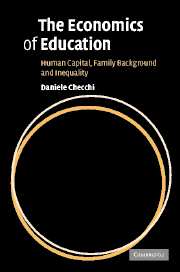Book contents
- Frontmatter
- Contents
- List of figures
- List of tables
- Preface
- 1 The relevance of education
- 2 The demand for education
- 3 Liquidity constraints and access to education
- 4 The supply of education
- 5 Education financing
- 6 The return on education
- 7 Intergenerational persistence
- References
- Subject index
- Author index
7 - Intergenerational persistence
Published online by Cambridge University Press: 22 September 2009
- Frontmatter
- Contents
- List of figures
- List of tables
- Preface
- 1 The relevance of education
- 2 The demand for education
- 3 Liquidity constraints and access to education
- 4 The supply of education
- 5 Education financing
- 6 The return on education
- 7 Intergenerational persistence
- References
- Subject index
- Author index
Summary
Introduction
So far we have considered individual choices of educational investment, to some extent neglecting their implications for aggregate equilibrium in the labour market. We have also glossed over the dynamic consequences of current choices. When an individual is educated, not only does he/she improve his/her future prospects in terms of employment probability, expected salary and job quality, he/she also increases the probability that his/her offspring will get educated as well, not to speak of the positive spillover for society as a whole.
With the help of simple models in the present chapter we attempt to disentangle the different channels through which the educational choices of one generation affect those of future generations. We will also provide some cross-country comparative evidence on intergenerational mobility in educational attainments, as well as speculating about potential determinants of observed mobility.
Before moving to formal models, let us review these channels in a cursory way. As we have already seen in previous chapters, educational choices are conditioned by individual unobservable abilities (labelled talent), family cultural background, family financial resources, public resources and – more generally – social capital. Most of these factors exhibit intertemporal and intergenerational persistence.
The transmission of unobservable ability can be genetic, such as race, height, eye colour, beauty, and so on.
- Type
- Chapter
- Information
- The Economics of EducationHuman Capital, Family Background and Inequality, pp. 215 - 251Publisher: Cambridge University PressPrint publication year: 2006



